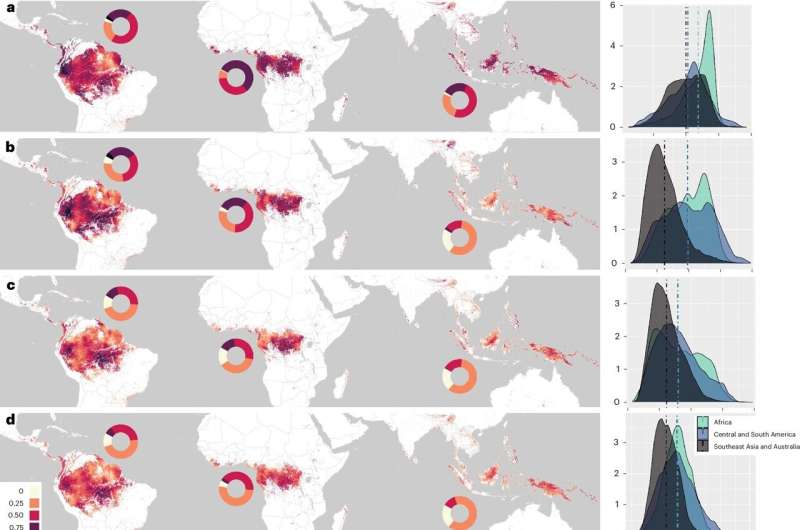This article has been reviewed according to Science X's editorial process and policies. Editors have highlighted the following attributes while ensuring the content's credibility:
fact-checked
peer-reviewed publication
trusted source
proofread
Rainforest wildlife under threat as below-canopy temperatures rise, new study warns

Assumptions that tropical forest canopies protect from the effects of climate change are unfounded, say researchers. Crucial strongholds for biodiversity are under threat as temperatures are rising in tropical forests, the world's most diverse terrestrial ecosystems, a new study reveals.
It has been long assumed that the forest subcanopy and understory—where direct sunlight is reduced—would be insulated from the worst climate change impacts by the shielding effect of the forest canopy.
The new study, published June 3 in the journal Nature Climate Change, used a microclimate model to examine temperatures beneath the rainforest canopy across the global tropics.
This showed that between 2005 and 2019, most of the world's undisturbed tropical forests experienced climate conditions at least partially outside the range of historical conditions. Many areas have transitioned to almost entirely new temperature averages.
Until recently, temperatures beneath the canopy in rainforests have remained relatively stable, meaning that the wildlife that lives there has evolved within a narrow range of temperatures. This leaves it poorly adapted to deal with temperatures outside this range.
The study found pronounced shifts in climate regimes in a significant proportion of tropical forests, including globally important national parks, indigenous reserves, and large tracts of ecologically unfragmented areas.
Recent studies in largely undisturbed, or primary lowland tropical forests have found changes in species composition and significant declines in animal, insect, and plant populations. These changes are attributed to warming temperatures and are consistent with the findings of the new research.
"Tropical forests are the true powerhouses of global biodiversity, and the complex networks of species they contain underpin vast carbon stocks that help to mitigate climate change. A severe risk is that species are no longer able to survive within tropical forests as climate change intensifies, further exacerbating the global extinction crisis and degrading rainforest carbon stocks," said Professor David Edwards at the University of Cambridge's Department of Plant Sciences, a study co-author.
"Our study challenges the prevailing notion that tropical forest canopies will mitigate climate change impacts and it helps us understand how to prioritize conservation of these key areas of biodiversity effectively," said Dr. Alexander Lees, Reader in Biodiversity at Manchester Metropolitan University, a study co-author.
He added, "It is paramount that distant, wealth-related drivers of deforestation and degradation are addressed and that the future of those forests acting as climate refuges is secured by effecting legal protection, and by empowering indigenous communities.
"Notwithstanding the fundamental need for global carbon emission reductions, the prioritization and protection of refugia and the restoration of highly threatened forests is vital to mitigate further damage to global tropical forest ecosystems."
"Tropical forests, home to many of the world's highly specialized species, are particularly sensitive to even small changes in climate," said Dr. Brittany Trew, conservation scientist for the Royal Society for the Protection of Birds, and lead author of the study.
She added, "Our research shows that climate change is already impacting vast areas of pristine tropical forest globally. To provide species with the best chance to adapt to these changes, these forests must be protected from additional human-induced threats."
"The world's rainforests are incredible reservoirs of biodiversity, harboring species that live in micro-environments in which climate conditions are generally stable. Thus, they are particularly sensitive to any changes brought about by climate change. It is vital that we take measures to safeguard these ecosystems from human pressures," said Ilya Maclean, professor of global change biology at the University of Exeter and senior author of the study.
More information: Brittany T. Trew et al, Novel temperatures are already widespread beneath the world's tropical forest canopies, Nature Climate Change (2024). DOI: 10.1038/s41558-024-02031-0
Journal information: Nature Climate Change
Provided by University of Cambridge





















